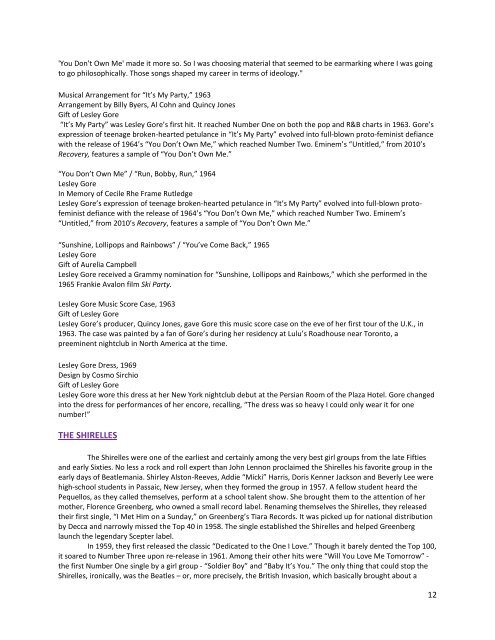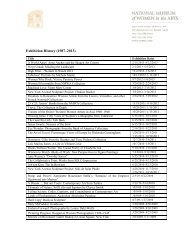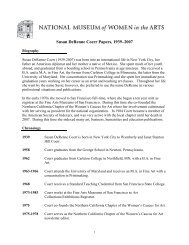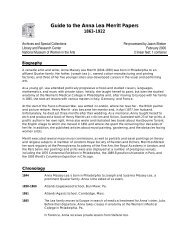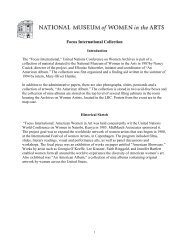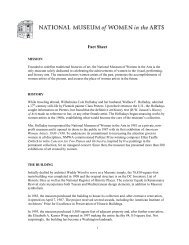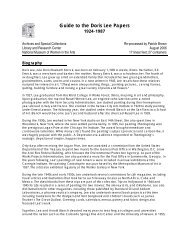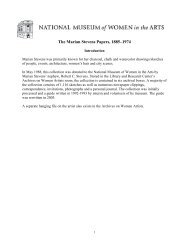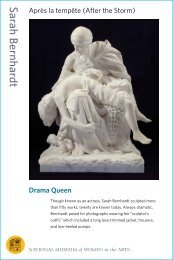LABELS AND TEXT PANELS - National Museum of Women in the Arts
LABELS AND TEXT PANELS - National Museum of Women in the Arts
LABELS AND TEXT PANELS - National Museum of Women in the Arts
Create successful ePaper yourself
Turn your PDF publications into a flip-book with our unique Google optimized e-Paper software.
'You Don't Own Me' made it more so. So I was choos<strong>in</strong>g material that seemed to be earmark<strong>in</strong>g where I was go<strong>in</strong>g<br />
to go philosophically. Those songs shaped my career <strong>in</strong> terms <strong>of</strong> ideology."<br />
Musical Arrangement for “It’s My Party,” 1963<br />
Arrangement by Billy Byers, Al Cohn and Qu<strong>in</strong>cy Jones<br />
Gift <strong>of</strong> Lesley Gore<br />
“It’s My Party” was Lesley Gore’s first hit. It reached Number One on both <strong>the</strong> pop and R&B charts <strong>in</strong> 1963. Gore’s<br />
expression <strong>of</strong> teenage broken-hearted petulance <strong>in</strong> “It’s My Party” evolved <strong>in</strong>to full-blown proto-fem<strong>in</strong>ist defiance<br />
with <strong>the</strong> release <strong>of</strong> 1964’s “You Don’t Own Me,” which reached Number Two. Em<strong>in</strong>em’s “Untitled,” from 2010’s<br />
Recovery, features a sample <strong>of</strong> “You Don’t Own Me.”<br />
“You Don’t Own Me” / “Run, Bobby, Run,” 1964<br />
Lesley Gore<br />
In Memory <strong>of</strong> Cecile Rhe Frame Rutledge<br />
Lesley Gore’s expression <strong>of</strong> teenage broken-hearted petulance <strong>in</strong> “It’s My Party” evolved <strong>in</strong>to full-blown prot<strong>of</strong>em<strong>in</strong>ist<br />
defiance with <strong>the</strong> release <strong>of</strong> 1964’s “You Don’t Own Me,” which reached Number Two. Em<strong>in</strong>em’s<br />
“Untitled,” from 2010’s Recovery, features a sample <strong>of</strong> “You Don’t Own Me.”<br />
“Sunsh<strong>in</strong>e, Lollipops and Ra<strong>in</strong>bows” / “You’ve Come Back,” 1965<br />
Lesley Gore<br />
Gift <strong>of</strong> Aurelia Campbell<br />
Lesley Gore received a Grammy nom<strong>in</strong>ation for “Sunsh<strong>in</strong>e, Lollipops and Ra<strong>in</strong>bows,” which she performed <strong>in</strong> <strong>the</strong><br />
1965 Frankie Avalon film Ski Party.<br />
Lesley Gore Music Score Case, 1963<br />
Gift <strong>of</strong> Lesley Gore<br />
Lesley Gore’s producer, Qu<strong>in</strong>cy Jones, gave Gore this music score case on <strong>the</strong> eve <strong>of</strong> her first tour <strong>of</strong> <strong>the</strong> U.K., <strong>in</strong><br />
1963. The case was pa<strong>in</strong>ted by a fan <strong>of</strong> Gore’s dur<strong>in</strong>g her residency at Lulu’s Roadhouse near Toronto, a<br />
preem<strong>in</strong>ent nightclub <strong>in</strong> North America at <strong>the</strong> time.<br />
Lesley Gore Dress, 1969<br />
Design by Cosmo Sirchio<br />
Gift <strong>of</strong> Lesley Gore<br />
Lesley Gore wore this dress at her New York nightclub debut at <strong>the</strong> Persian Room <strong>of</strong> <strong>the</strong> Plaza Hotel. Gore changed<br />
<strong>in</strong>to <strong>the</strong> dress for performances <strong>of</strong> her encore, recall<strong>in</strong>g, “The dress was so heavy I could only wear it for one<br />
number!”<br />
THE SHIRELLES<br />
The Shirelles were one <strong>of</strong> <strong>the</strong> earliest and certa<strong>in</strong>ly among <strong>the</strong> very best girl groups from <strong>the</strong> late Fifties<br />
and early Sixties. No less a rock and roll expert than John Lennon proclaimed <strong>the</strong> Shirelles his favorite group <strong>in</strong> <strong>the</strong><br />
early days <strong>of</strong> Beatlemania. Shirley Alston-Reeves, Addie “Micki” Harris, Doris Kenner Jackson and Beverly Lee were<br />
high-school students <strong>in</strong> Passaic, New Jersey, when <strong>the</strong>y formed <strong>the</strong> group <strong>in</strong> 1957. A fellow student heard <strong>the</strong><br />
Pequellos, as <strong>the</strong>y called <strong>the</strong>mselves, perform at a school talent show. She brought <strong>the</strong>m to <strong>the</strong> attention <strong>of</strong> her<br />
mo<strong>the</strong>r, Florence Greenberg, who owned a small record label. Renam<strong>in</strong>g <strong>the</strong>mselves <strong>the</strong> Shirelles, <strong>the</strong>y released<br />
<strong>the</strong>ir first s<strong>in</strong>gle, “I Met Him on a Sunday,” on Greenberg’s Tiara Records. It was picked up for national distribution<br />
by Decca and narrowly missed <strong>the</strong> Top 40 <strong>in</strong> 1958. The s<strong>in</strong>gle established <strong>the</strong> Shirelles and helped Greenberg<br />
launch <strong>the</strong> legendary Scepter label.<br />
In 1959, <strong>the</strong>y first released <strong>the</strong> classic “Dedicated to <strong>the</strong> One I Love.” Though it barely dented <strong>the</strong> Top 100,<br />
it soared to Number Three upon re-release <strong>in</strong> 1961. Among <strong>the</strong>ir o<strong>the</strong>r hits were “Will You Love Me Tomorrow” -<br />
<strong>the</strong> first Number One s<strong>in</strong>gle by a girl group - “Soldier Boy” and “Baby It’s You.” The only th<strong>in</strong>g that could stop <strong>the</strong><br />
Shirelles, ironically, was <strong>the</strong> Beatles – or, more precisely, <strong>the</strong> British Invasion, which basically brought about a<br />
12


